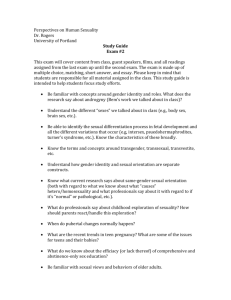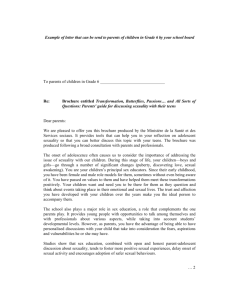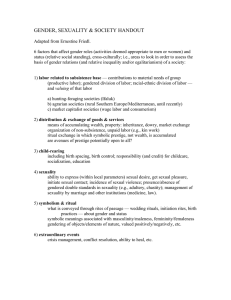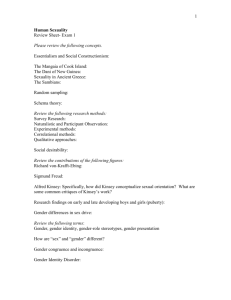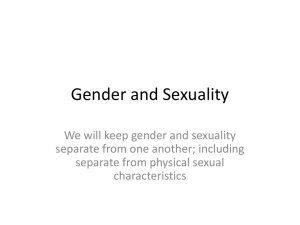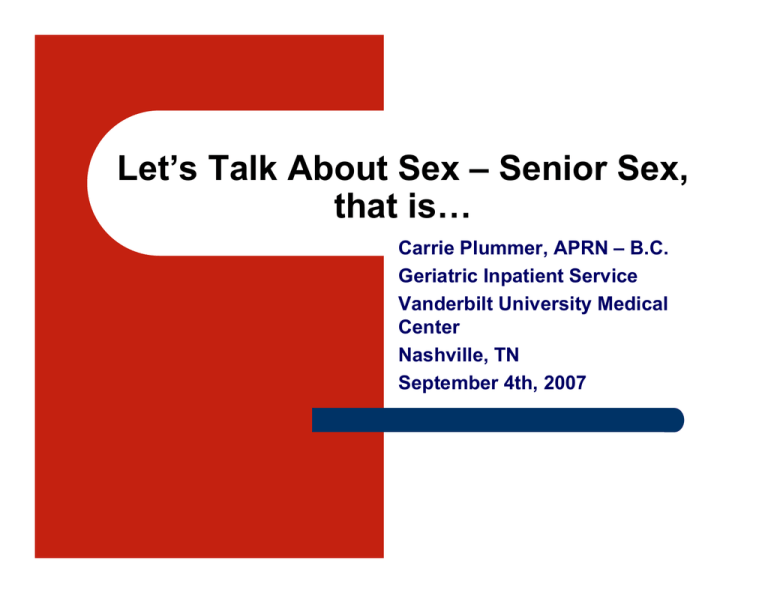
Let’s Talk About Sex – Senior Sex,
that is…
Carrie Plummer, APRN – B.C.
Geriatric Inpatient Service
Vanderbilt University Medical
Center
Nashville, TN
September 4th, 2007
A Personal and Professional
Journey
While a MSN student at VUSN
–
–
–
Worked with the Associate Director of Vanderbilt’s Women’s
Center on developing a Sexuality Series for undergraduates
We recognized a need for more in depth education for young
men and women, many of who had received “Abstinence Only”
programs in their high schools
Topics included: physiology/biology of sex and sexual activity,
cultural perceptions of sexual norms, communication w/ your
partner, virginity, pleasure, birth control, and a panel
discussion.
A Personal and Professional
Journey
Encountered resistance from an administrator, when
asking to publicize this “Sexuality Series” at the School
of Nursing, who regarded this information as
“inappropriate” for MSN students!
If the nursing model of health care emphasizes
“Wholism”, can we ignore issues of sexuality and
sexual health?
We perpetuating ageist attitudes if, as HCPs, we deny
the older adult’s need for knowledgeable, nonjudgmental and current health care information on
sexual health.
Personal and Professional Belief
The average life span of the older adult is being
extended and “active living” includes emotional and
physical expressions of connection w/ others
What is lacking is societal acknowledgement that sex,
sexuality and the need for physical intimacy does not
precipitously disappear after people enter their 6th
decade of life. (Nay 1992; Spector & Fremeth, 1996;
Kaas, 1972)
Demographic Data on Older Adults
– Present and Future
In 2003 - 36 million or 12% of
U.S. population >65 years old
In 2030 – 71.5 million or 20%
of U.S. population >65 years
old
In 2003, the number of U.S.
women on HRT declined from
42% to 28% after WHI
published their report in 2002.
AARP “Sexuality and
Maturity” 1999 – 43% of men
and 35% of women aged >55
reported having sex at least
once a week.
5% of people age 65 and
20% of those over 85 will
spend time in a long term
care facility
In a study of 15 SNF in
Texas, w/ mean age of 82
years, 81% of men and 75%
of women reported sexual
desire, but were currently
sexually inactive because of
lack of opportunity. (Hajjar
and Kamel, 2003)
American Psychology Association
Ageist myths:
Increasing age brings about
greater psychological distress.
Older adults are more depressed
than younger adults.
As individuals reach old age,
they become preoccupied with
memories of their childhood and
youth.
Older adults are less satisfied
with their lives than younger
adults.
Older adults are alienated from
the members of their families.
Because older adults generally
do not reside with their children;
they rarely see them.
Increasing age brings about a
decline in sexual desire and
interest.
Older adults are not physically
capable of engaging in sexual
intercourse.
Older adults are very isolated
from their communities.
Social contacts decrease with
increasing age.
Older women focus mainly on
keeping families together.
Older women suffer from poor
physical health.
http://www.psichi.org/pubs/articles/article_38.asp
Cultural Beliefs on Sex and
Sexuality
What is sex?
–
What is sexuality?
–
How do we define sex/sexual activity in the U.S. in the year
2007?
How do men, women express their sexuality?
What is sexy?
–
How do we, as a culture, create standards through which our
perceptions are shaped as to who/what is attractive or
desirable?
Older Adult Sexuality in the Media:
Pepsi, Britney Spears and Representations of Older
Adult Sexuality
http://www.youtube.com/watch?v=Jt8uNG02ix
A
Sex and Seniors
How do our perceptions
impact on our practice
as Health Care
Providers for the older
adult patient?
–
–
What do you think of when
you view these pictures?
What health issues would
you have on your mental
list of “things to address”?
Physiology and Psychology of Aging Impact on Sexual Health and Sexual Expression
Men
–
Erectile Dysfunction (ED)
–
Other Health Issues w/out ED as a component
–
HTN, diabetes, BPH and s/p prostatectomy, insufficient
testosterone, chronic pain, medications (beta blockers)
Treatments – Viagra/Cialis, testosterone replacement, penile
implants, pumps, treat diabetes, pain management
HTN, chronic pain, arthritis, COPD, diabetes,
Life gets in the way
Family, Work, Stress, Depression (men less likely to discuss this)
Physiology and Psychology of Aging Impact on Sexual Health and Sexual Expression
Women
–
Peri and Post Menopausal changes
–
Other Health Issues
–
Peri menopause: early/mid forties onset for most women
including hot flashes, lack of sleep, irritability, depression,
Post menopause: lack of estrogen causes thinning vaginal walls,
decreased elasticity, the vagina shortens and narrows, and
decreased lubrication during sexual arousal
The Women’s Health Initiative – Hormone Replacement Therapy
(HRT)Peri and Post menopausal changes
Chronic pain, hysterectomy, mastectomy, HTN, diabetes, arthritis
Life gets in the way
Family, Work, Stress, Depression, Sexual Trauma
Senior Sexuality Stating the Obvious
Despite these barriers, both cultural and
physical, older adults are still interested in and
having sex!
Lindau, ST et al, NEJM, 2007 “A Study of
Sexuality and Health among Older Adults in
the United States”
–
“the majority of older adults are engaged in spousal
or other intimate relationships and regard sexuality
as an important part of life”
The Gray Panthers –
Hear Them Roar
According to the AARP “Sexuality and Aging” survey,
older adults, “wanted health care providers to know
that ‘sex was not just for the young’ and to promote an
open, accepting environment in which sexual issues
could be discussed” (Amin et al., 2003, p. 1175).
Lack of sexual expression and intimacy can lead to a
decreased Quality of Life. (Bauer, 1999; Bauer &
Geront, 1999, Hajjar & Kamel, 2003; Hajjar & Kamel,
2003; Kaas, 1978; Palacios et al., 2002)
Sexually Transmitted Infections
(STIs) in the Older Adult
What percentage of people over 65 are diagnosed w/ a
new STI each year?
What percentage/number of people over 65 have an
STI and NOT diagnosed?
–
–
CDC, “for the years 2000 through 2003, an estimated 30,000
men and women were 45 or older at the time of their diagnosis
of HIV, comprising 23 percent of the total diagnoses during
those years.” This population “accounted for 30 percent of all
those diagnosed w/ AIDs in 2002 who had been infected
through heterosexual sex.”
(http://www.aarpmagazine.org/lifestyle/relationships/hiv_over_50.html)
Between 1991 and 1996 the number of AIDs cases in people
over 50 increased twice as quickly than in younger adults.
(HAHOF, 2005)
STIs in the Older Adult
Answers to these questions are difficult to ascertain as
there is a dearth of data.
As of 2005, the public health data ended w/ age 50 or
55! In Europe, older adult data was grouped age 45
and up.
In health care, funding is often driven by “perceived”
need . That is, if the data is there and the problem
evident, funding will be awarded.
Sexually Transmitted Infections
(STIs) in the Older Adult
“Condo Cowboys” - per the literature, in
independent/assisted residential communities
men with multiple sex partners.
“In Chicago, a study determined that 44% of
men older than 60 reported multiple sexual
partners”
Risky behaviors are not limited to the younger
generations
STIs in the Older Adult Missing the diagnosis
HIV symptoms can mimic symptoms of many other
disease processes that are common in older adults.
–
Fatigue, weight loss, dementia, skin rashes, lymphadenopathy,
resistant bacterial infections, respiratory complications, skin
problems can be mistaken for thyroid or endocrine disorders,
depression, cancer, or failure to thrive (FTT).
Older adult immune system less likely to mount a
response in comparison to younger adults – therefore
the “flu-like” symptoms of HIV infection may be initially
more muted
–
According to one study, “Among diagnosed AIDS patients 80
years or older, 37% die within 1 month of diagnosis”.
Zelenetz PD, Epstein ME, HIV in the elderlu. AIDS Patient Care STDs. 1998; 12(4): 255-262
STIs in the Older Adult Treatment Complications
Complicated co-morbidities and polypharmacy make
HIV treatment more complex
Decreased liver and renal function and dosing
antiretrovirals
DM Type 2, osteoporosis and hyperlipidemia amplified
by most common antiretrovirals
Lack of research on HIV medications in people over 65
Side effects and quality vs. quantity of life
Real Life experiences
Mrs. D 85 yo WF w/ new onset of AMS. Hx of
HTN, chronic back pain, diabetes, recurrent
UTIs, wheelchair bound and early dementia.
–
–
–
What questions would you ask in the H&P?
What tests would you order?
What’s your differential diagnosis?
Barriers to optimizing older adult sexual
health in the Health Care setting
Health Care Provider
–
–
–
–
–
Discomfort and/or
embarrassment
Personal beliefs (religious,
cultural, etc…)
Lack of education
Lack of time and “prioritizing”
health issues that “matter
more”
The Medical Model focuses
on the dysfunction of a
system. Sexuality and sex
are more than just the penis
and vagina.
Patient
–
–
–
–
Discomfort and/or
embarrassment
Personal beliefs
Lack of Knowledge
Community vs. SNF dwelling
– for the latter, may assume
that the geographical barriers
are insurmountable and,
therefore, don’t bother to
bring these questions up.
Mr. Smith 92 yo WM w/
syncopal episode
What can we do, as HCPs?
How do we, as HCPs, address issues of sexual health
w/ our older adult patients?
–
–
–
–
Incorporate sexual health history into an initial/new patient
appointment. Should this be on paper? In person?
Do we initiate the discussion? Or do we allow the patient to
ask? What could be problematic with either of these
approaches?
Safe sex – how would you feel about educating a 70 year old
Widower on condom use and HIV testing?
Better sex – are you able/comfortable with giving a 79 year
old, post menopausal woman advice on how to improve her
sex life w/ her current partner? (i.e. types of lubrication, sex
toys, positions/methods of sexual expression that account for a
less abled physical status, safe sex, etc…)
Books - Information for the patient and
the Health Care Provider
Books
–
–
–
–
–
Dr. Ruth “Sex after 50”
Robert Butler “The New
Love and Sex after 60”
Robert Wolley “Seniors in
Love”
Ruth Jacobs “Be an
Outrageous Older
Woman”
Google/Amazon.com
Websites - Information for the patient
and the Health Care Provider
AARP
–
http://www.aarp.org/
2000 Sex Survey
HIV over 50
–
HIV
–
http://www.hivwisdom.org/
Sue Johnson
–
http://www.talksexwithsue.co
m/index2.html
Dr. Ruth
–
http://love.ivillage.com/author
/bio/0,,prtr,00.html
http://www.nia.nih.gov/
Sexual Health
–
http://www.seniorjournal.com/
Sex.htm
Institute on Aging
–
www.seniormatch.com
Senior Journal on Sex and
Senior Citizens
–
Dating
http://sexhealth.healthology.c
om/focus_webcast.asp?f=se
xual_health&c=healthyaging_
sextaboo#
What can we do as HCPs in the
Nursing Home Environment?
So far, these questions have focused on the older adult
living in the community. What about the older adult
resident of a Skilled Nursing Facility (SNF)?
What barriers exist to sexual expression and sexual
health?
–
–
–
–
Lack of privacy
Physically disabled/debilitated
Negative attitudes of staff and family members
Cognitive decline – at what level of dementia can a person no
longer give consent?
Legal issues
Family concerns
Staff bias/ageism
Developing a Senior Sexuality
Series
What topics would you include? In what setting would
you deliver this information?
–
–
–
–
–
–
Sexuality of older adults – cultural, medical, religious, and
personal constructs of sexuality
Physiological changes in the older adult woman/man and their
impact on sexuality/sexual health
What can your NP/MD do to help w/ these issues?
Safe Sex for Seniors (STIs, protection, testing, treatment,
etc…)
Alternative methods and means of physical and emotional
pleasure/enjoyment
Discussions on how to make Assisted and Long Term Care
Facilities more ‘Senior Sex Friendly’ for residents
Senior Sexuality
Thank you for your time and attention!



